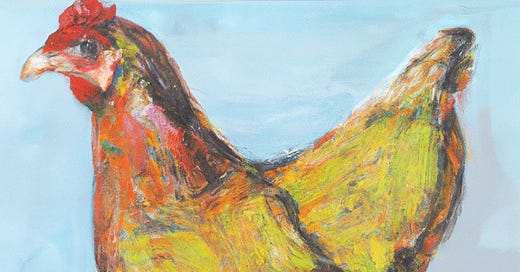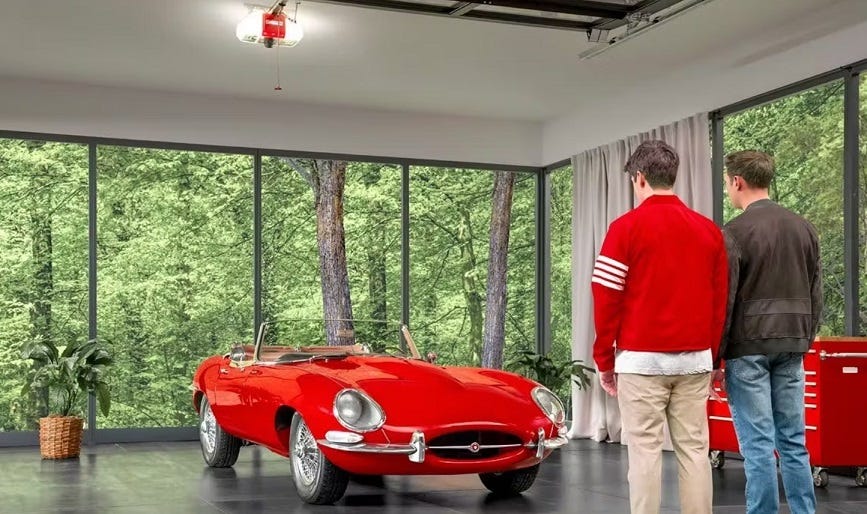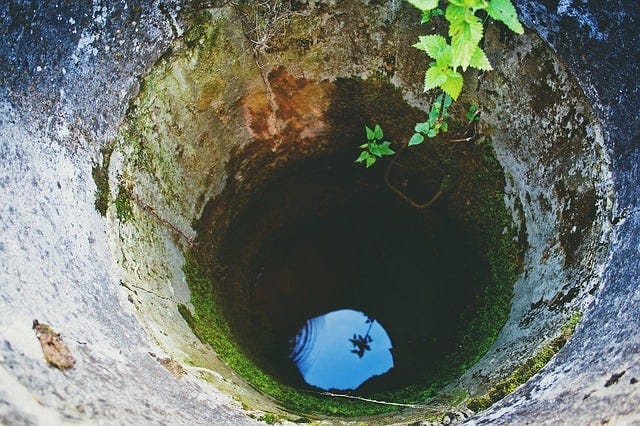One morning, in a small hamlet on the northern coast of Ireland, a farmer found that his chicken laid diamonds instead of eggs.
When he first noticed this, he was not happy. He was so unprepared for this miracle that he actually threw away the gems. When his wife found them in the garbage bin, she couldn't believe her eyes. Recognizing them for what they were, she ran out to the barn, stockings unshod, shouting hysterically at her husband.
As he gradually got her to calm down, her socks slowly sinking into the marshy mud, the reality of their situation also sunk into their awareness:
They were rich!
The first thing the farmer did was bring the chicken inside the house for safe-keeping. Unfortunately, the hen quickly became irritable because she missed her friends and the fields. The ever-present squawking and scratching bothered the humans, but they put up with it. She laid her diamonds, and they collected them greedily.
That weekend, the farmer and his wife raced into town. The parochial jeweler was likewise unprepared for such a treasure, and so skeptical of the farmer, that he offered him a tenth of the stones' true value. The farmer and his wife had never seen so much money, so they didn't bother to negotiate.
Before they returned to the farm, they spent all their coin on extravagant groceries and goods: bacon, coffee, and sugar; a new bonnet for her, new workboots for him, plus a steel shovel (though the old one was fine), and a polished leather saddle (though they had no horse).
Over the next weeks, the pattern continued. The hen produced her diamonds, but they were smaller and smaller. She was losing weight from being kept so uncomfortably. And the farmer got less and less money from the appraiser, and spent it faster and faster on more and more luxurious purchases.
Then one day, the chicken died.
Life was harder after that. Somehow, things seemed worse than before the chicken. They had never really anticipated that she would die, and especially not so soon. The things they had bought were indeed very nice, but upon reflection, weren't really that important, not for helping them sustain the farm, at any rate.
Looking back, it was obvious what they should have done— focus first on preserving the asset, instead of reaping the rewards. But, alas, it was too late.
Full farmhouse
Because we are impartial observers to the story, the right choice is obvious. But in our own lives, we don't always act so wisely. I've made mistakes in many similar situations, which is what led me to the decision I’m making this week.
The fact is, the real world is much more complicated than the story. It's not always clear that the chicken is dying, or that we're spending the gems on the wrong purchases. It's not even obvious sometimes that the eggs are diamonds in the first place. The problem is threefold.
First, we tend to overemphasize the short term. For example, in relationships, we get lots of satisfaction from reaping the rewards, which is often why we enter them in the first place. When single, we are apt to say, "I want a girlfriend (or wife)," instead of the equivalent statement, "I want to be a boyfriend (or husband)." In the first statement we focus on the benefits, in the second, the responsibilities. But the two are interlinked.
In relationships, we prefer the activities that make us happy, the things that are convenient for us. But we also have to invest in the relationship itself, doing the things that the other person enjoys, showing up early (or staying late) for them, going the extra mile to make them feel loved and appreciated, and sometimes just letting them do their own thing even when we want to be with them. All this typically requires thousands of little sacrifices.
These sacrifices are demonstrations of love, but also its very essence. Although costly, they make the relationship way more healthy in the long run, producing even greater rewards. But it's easier to take the short-term view, to focus on getting what we want for ourselves now, especially when we're stressed from other areas in life.
Which leads us to the second problem: we aren't just taking care of one chicken, but an entire farmhouse full of animals. And they're all different. It's difficult to balance them all.
For example, if you want your family to have a good life, you need to have a good career to support them financially. But if you focus too much on your job, you withhold your time and energy from them, something they also want and need. But you can't spend all your time with them and neglect your job either. It's a dilemma.
Then there's your physical health. You need to stay healthy so you have the energy and mobility to do your job well, and to spend time with your family.
Then there's your mental health. You need to take time away from everything else to do YOUR own things. Maybe that means playing the guitar, or watching TV, or meditating and praying, or going to the Renaissance fair. And you gotta have your own friends, to keep you sane, and give you advice, and listen to your crazy rants (sometimes about your family).
These priorities don’t all have to be mutually exclusive. But still, it takes a lot of work to save all the chickens.
And the third and final problem is that it's not just about protecting the asset. We also need to enjoy the rewards, otherwise all our effort is for naught.
It's possible to be so obsessed with the asset that we never get to enjoy it. Remember the Ferrari from Ferris Bueller's Day Off? Cameron's dad spent every day maintaining the vehicle, keeping it clean, ensuring it was safe. But he never drove it. What's the point of that?
It can happen to every asset in our life. We can spend so much time building up our savings that we never get to use them, at least until we are too old to do so. We can spend hours exercising and eating healthy every week so we can live 5-10 years longer, only to realize those extra years were spent sweating and counting calories.
Taking care of all the farm animals in our life is difficult. And that can become a job in itself, when we focus too much on over-optimizing everything and trying to do too much. I'm guilty of that more than anyone. I’ve failed a lot of chickens in my life, some more important than others…
Say Less
I've now published an essay every week for 32 weeks in a row. It's been incredibly stressful, but that stress has also been good for me: I've accomplished something I never thought possible.
Earlier this year, I declared that my goal was to publish 52 weeks in a row.1 Well, I'm gonna break that goal. At least, half of it.
The other half of that goal was to publish 100,000 words. But as of this essay, I've now accomplished that. This is a big deal for me, and I'm really proud of myself.
However, it's a bit too early. My logic for that magic number was 52 weeks times 2,000 words per essay equals six figures.
The problem is, I've been too wordy. My average word count is closer to 3,000. It's not clear, but the research suggests that the average reader on Substack stops reading after 1,000 words. Granted, I hope my audience has a longer attention span, and that my writing is a bit more engaging, but it's hard to tell.
I'm sorry that this was such a long letter, but I didn't have time to write you a short one. —Blaise Pascal
It's very difficult to be concise.
When we talk, we naturally use extra information. This helps us to understand each other, because words have a way of being misunderstood. The classic there vs. their vs. they're. Or also are vs. our vs. R vs. arrrr (matey). To combat this, we layer in unnecessary information.
For example: "that man is a soldier" vs. "those men are soldiers."
In the first sentence, it's implied five different times that we are talking about a single person. In the second, it's implied another five times that we are talking about multiple people. There's no need for that level of redundancy.
And that's just a very simple example, but it happens all the time in our language, and the the extra information begins to compound very quickly.
But also, I'm missing the point here. Because the truth is that it sometimes it just takes a lot of time talking over things to figure out what's important, and what's not. Yes, technically, redundancy in our language does contribute to longer sentences and conversations…
But more importantly, we just have to talk a lot in order to know what we're talking about. Ironic, isn't it? And that's the real reason it's hard to be concise.
But by the time we've figured out our point, from a writing standpoint, we've already created all these beautiful sentences, and we'd hate to destroy them. But as Stephen King advises, "Kill your darlings. Kill your darlings. Kill your darlings."
This is hard, but ultimately more rewarding. (Noticing a trend here?) Because using fewer words to convey the same message is powerful. For example, famous designer Dieter Rams summarized his entire philosophy in this phrase: “Less, but better.” As you might imagine, his design approach was very minimalist. Everything was evaluated on that one metric— is it simple?
The same concept shows up everywhere. If you want a fast vehicle, you can either build a car with a massive engine that is powerful but heavy, or a motorcycle that is very lightweight and efficient. Both vehicles will go the same speed, but one costs less, uses less gasoline, and takes up less space.
And all our technology is powered by this principle— elegant code. The app you're reading this on is written in computer code, which is essentially a long list of instructions that tell the computer what to do. Novice programmers write thousands of lines of code, which take a long time for the computer to process. Expert programmers do the same thing with two lines.
"Brevity is the soul of wit."
— Polonius, Hamlet II.2.92
Conclusion
To bring it full circle: How do we balance the asset and its rewards, especially with multiple assets?
The answer is leverage.
It's about finding the optimal balance between investment and output. We could spend 40 hours at work each week, or we could spend 80, but will the latter option give us twice as much income? But spending 20 hours at work is probably not enough, either.
We could do the same thing with our loved ones, and either smother them with too much of our presence, or make them miserable in our absence. We want to make the investment that produces the most meaning, without sacrificing too much of the other things that bring us life.
So all this to explain the decision I've made:
I will publish one essay every two weeks.
Why?
To focus more on concision and leverage. I want to take more time to polish my essays, saying more with less. But this takes a lot of time, since "90% of writing is re-writing."
To focus more on the asset. It's funny to consider these essays as diamonds, because I always hate starting them. But by the end, every time, I absolutely love them.
Unfortunately, I haven't been investing in the asset of my writing engine, namely, by reading and taking notes. I've been drawing from the same well of knowledge and creativity all year long, and it's starting to run dry. I find myself relying on the same few authors and the same few techniques. And I need to refill my well.
In short, I’ll be focusing on quality over quantity. In doing so, I hope to keep this writing-chicken alive and healthy over the long run, and also save all my other chickens. Or at least, I’ll do the best I can with what I’ve got right now.
What assets and rewards do you need to re-examine your relationship with?
And where do you need to focus more on leverage?
Footnotes:
My declaration of my writing goal:
Why do you write?
Sometimes, I feel like writing these essays every week is a complete waste of time. Right now, as I stare at my screen, trying to get myself to begin, writing is the last thing I want to do. I hate this and I don't want to do this. And yet… ...there's something about it that keeps me going.










Great ideas to ponder. I’ve found that keeping my life balanced requires constant tweaking. Do whatever you need to in order to refill your well because your essays are so unique, interesting, and entertaining!